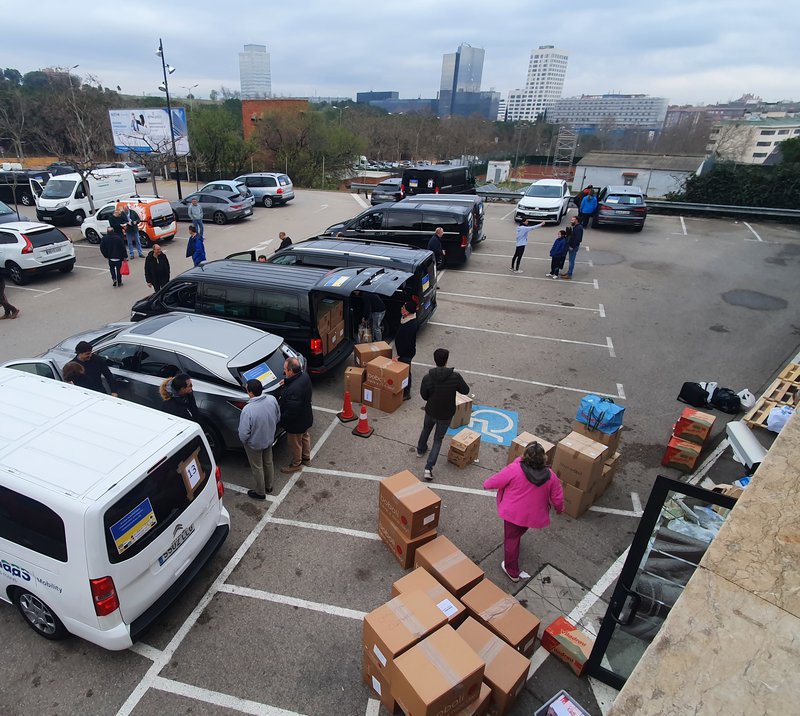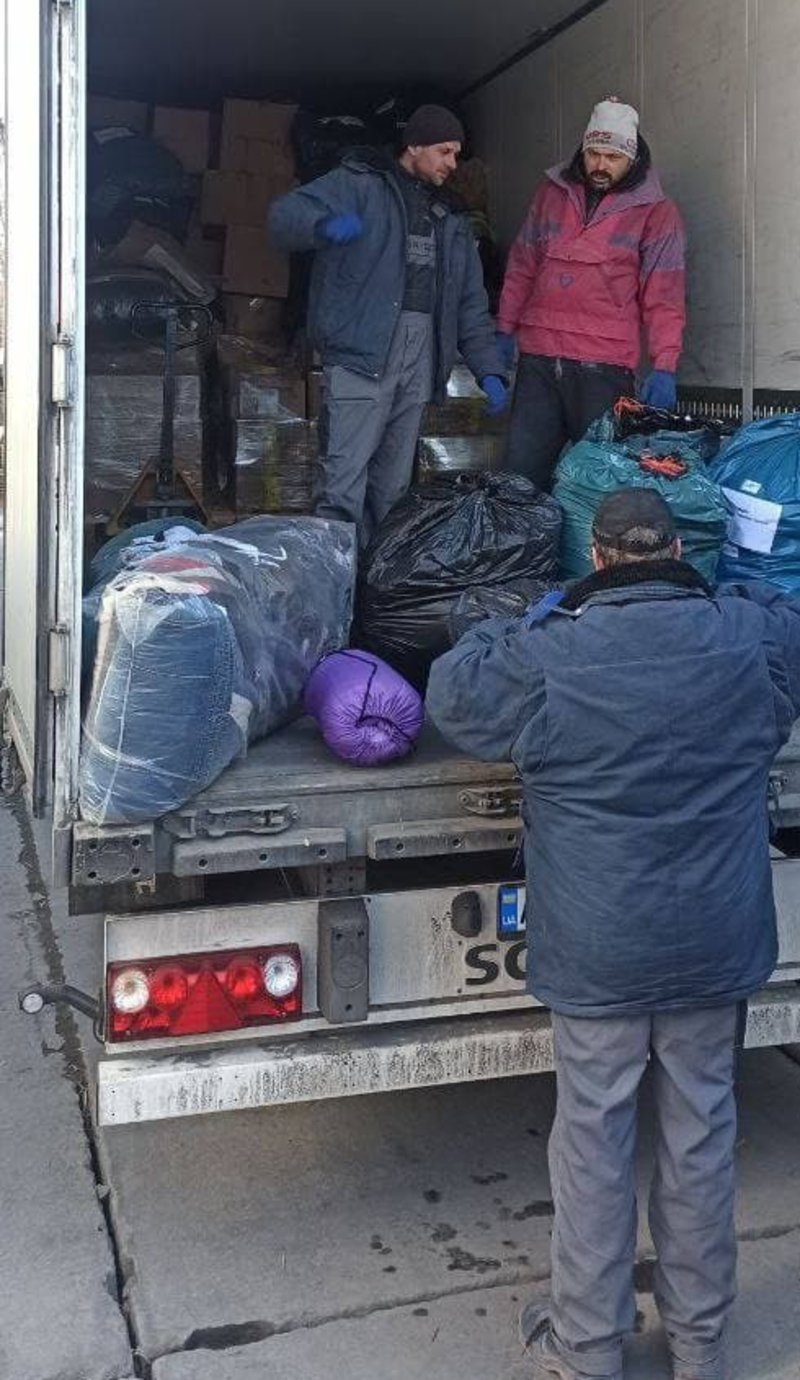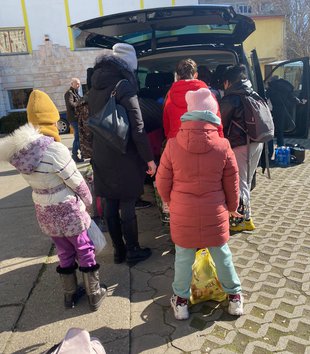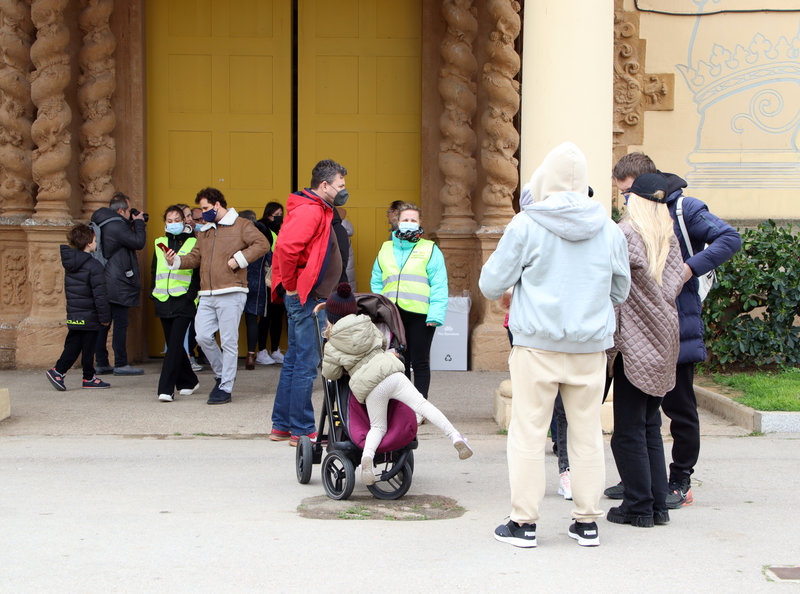4,000 kilometres of solidarity
A humanitarian convoy of 16 vans returned to Catalonia from Romania with some 70 Ukrainian refugees
Jana and Cherkel Rejerov were due to celebrate Nazar’s first birthday party on the last Sunday of February in Kharkiv, Ukraine’s second largest city, but the first Russian bombs began to fall and they were forced to flee their home. There was little time to pack and they hardly knew what they had put in the suitcases they finally unloaded in the Catalan town of Sant Quirze del Vallès two weeks later. For a fortnight they had travelled across Ukraine by train, bus and, at times, on foot, before they crossed the Romanian border in freezing temperatures and snow.
Cherkel was allowed to leave the country because he is from Turkmenistan, but had to leave Jana’s parents in Ukraine. They finally managed to get a comfortable night’s sleep in a Caritas centre where they were picked up by the convoy of vans that had left Sabadell a few days before. The result of a private initiative by a group of friends, the convoy had brought humanitarian aid to Ukraine via Timisoara (Romania) and was ready to take refugees back to Catalonia. The Rejerov family is just one of many that the convoy from Sabadell has brought out of Romania. So far they have helped 70 refugees, some 30 of whom decided to stay in Milan, with the others arriving in Sant Quirze and Barcelona.
Accompanied by his mother, Anna Lozinskaya, 12-year-old Vova spent much of his time in the van on video calls with his father, who had to stay to help defend his country. They left city of Mykolaiv near Odessa a week before they crossed into Romania after passing through Moldova. As almost none of the refugees spoke English, they used sign language to communicate with the van drivers until someone came up with the number of a Ukrainian speaker living in Catalonia.
Waiting for Anna is her sister-in-law, who has lived in Barcelona for six years, but most of the refugees have no contacts in Catalonia and are staying with families in Sant Quirze. The mayor of the Vallès Occidental town, Elisabeth Oliveras, was there to welcome the refugees and oversee their distribution to the private homes of locals who had volunteered to host them. “We are mobilising resources. Compared with the state, the citizens respond much faster,” she says.
The idea for the convoy began with four friends. Emilio Sarrión knew the Spanish consul in the Romanian city of Timisoara, Josep Miquel Viñals, he got in touch and in just one week they had raised 30,000 euros in donations to rent vans and to cover the fuel and travel expenses. In the end, they managed to fill the so-called Convoy of Sixteen with medicines, clothes and food that were unloaded a few days later in the Romanian city of Ghiroda, near Timisoara. Waiting for them was the consul, who had arranged for the now empty vans to collect the refugees.
international ukraine crisis
“We can never forget”
Journalist Felicia Ristea covered the arrival of the convoy for Radio Romania. The journalist says there are thousands of refugees at every border crossing and estimates that roughly 20% of those arriving in Timisoara want to stay in the area, as there are some Ukrainian communities that settled there decades ago. Ristea adds that Romanians are also anxious: “Here in Romania people fear Putin; we were part of the Eastern bloc, we remember what it was like and we can’t forget it,” she says.
Catalonia welcomes over 12,000 Ukrainian refugees
One of three reception centres in Spain is in Barcelona; over 1,200 displaced people receive residents permits
By the end of March, Catalonia had welcomed some 12,000 refugees fleeing the war in Ukraine. This was information provided in an update on the situation by the Catalan government spokeswoman, Patrícia Plaja, who added that since the outbreak of the war, almost 800 Ukrainian children have been placed in schools in Catalonia.
Also at the end of March, the state authorities reported that 1,252 Ukrainian refugees in Catalonia had been granted a residence permit and, in the case of adults, a work permit. This number is about 10% of all the permits so far given out around Spain. According to the state government, any displaced person who arrives in Spain can request temporary protection in one of the three reception centres open in Barcelona, Madrid and Alicante, or in the 54 provincial police stations around the country that have been enabled to process such requests.
Montjuïc reception centre
The reception centre for Ukrainian refugees in Barcelona is located in the Fira de Montjuïc. It is a first stop for Ukrainian refugees looking for permission to reside and work in the country. After being processed by a team from the National Police, the permit granted includes a photo ID card with a fingerprint and a NIE identity number so that the person in question can legally work and access social services. The centre has ministry staff who can provide emergency accommodation in a hotel for those without anywhere to stay.
The Catalan government and the Barcelona city council also have staff in the centre, as these authorities are responsible for providing public services to the refugees. The centre also has specialists in such areas as psychosocial support, pediatrics, social care and nutrition, while the Red Cross also has a care space.







